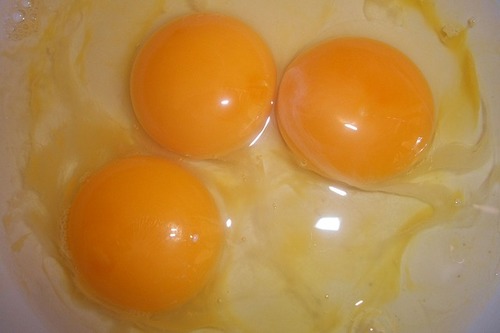Are Egg Yolks Bad For You?
Short answer
If you are healthy and have stable cholesterol levels, egg yolks shouldn't do any harm. They can also be very beneficial in moderation.
Recommended Alternative
Overall beneficial to your health. Things rated a 'B' may have some harmful qualities to pay attention to.
View Full Grading System
Category 'A'
Very healthy and numerous health benefits. Side effects are rare. Things rated an 'A+' are typically necessary for survival (for example, water).
Very healthy and numerous health benefits. A few harmful qualities may be associated, but only under certain circumstances such as an allergic reaction.
Very healthy and numerous health benefits. Harmful qualities may be associated, but aren't usually serious.
It is important to note that even the best things in life can become bad in immoderate amounts. So, although something may be rated an 'A+', overconsumption/overdoing can bring unwanted effects.
Category 'B'
Very beneficial to your health. Things rated a 'B+' may have a few harmful qualities to pay attention to.
Overall beneficial to your health. Things rated a 'B' may have some harmful qualities to pay attention to.
More beneficial to your health than not. However, harmful qualities are most likely associated and shouldn't be overlooked.
The main difference between category 'A' and category 'B' is the harmful qualities typically present in 'B' items. Serious side effects are usually uncommon, but are still possible and should be taken note of.
Category 'C'
Both beneficial and harmful qualities associated. Things rated a 'C+' are typically a bit more on the beneficial side. Still, moderation is important.
A fairly even ratio of beneficial and harmful qualities. Moderation is important. Very general topics that can lean towards both sides of the spectrum will be placed here as well. Rice, for example, can be good or bad depending on the type.
More harmful than beneficial. Side effects are common, especially when consumed/done excessively. Moderation is very important.
Category 'C' usually denotes to both good and bad qualities. When it comes to this category, it is important to keep this word in mind: moderation.
Category 'D'
Harmful to your health. Although benefits may be associated, the bad most likely outweighs the good. Moderation is very important.
Harmful to your health. A few benefits may be associated, but the bad outweighs the good. Moderation is extremely important.
Harmful to your health. Very few, if any, benefits are present. Things in this category should be avoided as much as possible.
Category 'D' is typically for things that are more harmful than beneficial. While consuming/doing something unhealthy once in a blue moon shouldn't hurt, we definitely recommend eliminating 'D' items as a regular part of your routine/diet.
Category 'F'
Category 'F' is for things that fail to bring anything beneficial to the table, and are very harmful to your health. We recommend completely avoiding anything in this category. Long-term side effects of 'F' items are usually very serious.
Category 'N'
'N' stands for neutral. Things placed into this category are generally (a) neither good nor bad for you, or (b) lack the necessary evidence to reach any conclusions.
Long answer
Egg Yolks can be quite a bit of controversy. Many people say that the yolk is the "fatty" part and hence only eat egg whites. But is this true?
Egg yolks contain a rich array of essential vitamins and minerals, particularly vitamins A, D, E, B12 and K, riboflavin, folate, and iron. Therefore when many people discard this area they are losing out on the nutritional benefits of the egg. The egg whites, however, are a low-calorie protein source; due to this, many people believe that the whites are the only healthy part of the egg.
Another reason for the controversy is because of a past study conducted regarding the high cholesterol levels in the egg yolk. It was said that the yolk should be avoided to preserve good heart health. However, various studies, including one done by Harvard, showed that the cholesterol in eggs does not impact our cholesterol like we think it does. While many believe the cholesterol floating around in our bodies comes from food, it's rather the cholesterol our livers produce in response to a high intake of saturated fat and trans fat. Yes, egg yolks are still fairly high in cholesterol, but if you are generally healthy, consuming them moderately should not affect you. Many also claim that egg yolks raise "good cholesterol" and not the bad kind.
Furthermore, two interesting yet beneficial nutrients found in egg yolks are carotenoids and choline. Carotenoids - the pigments that give egg yolks their bright yellow appearance - lower the risk of age-related macular degeneration and cataracts. Choline, on the other hand, helps to regulate cardiovascular function and can even decrease the risk for breast cancer (in women) by up to 24%.
Egg yolks are a great source of nutrients and should be consumed (in moderation) to obtain a nutrient rich diet, or in this case, a nutrient rich scrambled egg breakfast.
Possible long-term side effects
- heart disease
-
weight gain
-
inflammation
Ingredients to be aware of
Benefits
- promotes heart health
-
promotes eye health
-
improves the immune system
-
reduces risk of breast cancer
-
balances electrolytes
-
source of many essential nutrients
-
increases "good" cholesterol
Our Wellness Pick
(what is this?)
Bob's Red Mill Egg Replacer
- Gluten-free substitute
- Convenient resealable pack
- Vegan-friendly
- Non-GMO
- Long shelf life
Learn More!
Please turn your Ad Blocker off to see this content. Thank you!
Thank you for your feedback!
Written by Kathan Natrajan
Published on: 12-27-2015
Last updated: 12-15-2023
Thank you for your feedback!
Written by Kathan Natrajan
Published on: 12-27-2015
Last updated: 12-15-2023

 Approved by
Approved by 















